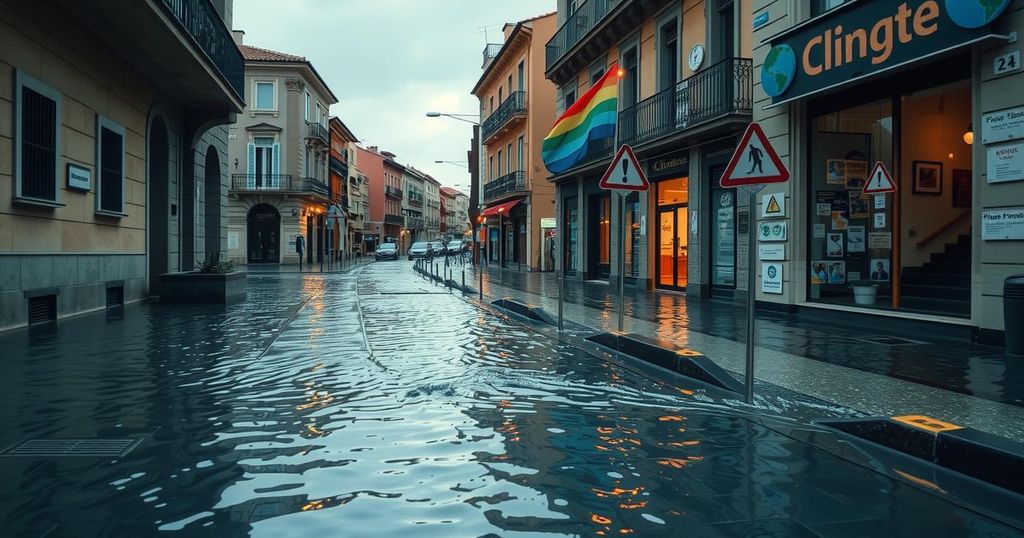Spain’s recent floods highlight the growing severity of extreme weather events exacerbated by climate change. Claims of increased rainfall intensity due to human-induced warming showcase the urgent need for improved infrastructure and preparedness measures. The Mediterranean region faces compounding risks of drought and floods, necessitating a shift from awareness to actionable strategies. Global collaboration is essential to address these challenges and mitigate the ongoing climate crisis.
Amidst growing climate change challenges, Spain’s recent floods serve as a stark warning of the escalating severity of extreme weather events worldwide, prompting a crucial examination of preparedness strategies. The significant rainfall that inundated regions such as Valencia, claiming at least 158 lives, underscores the reality that increased atmospheric temperatures, primarily due to fossil fuel emissions, are intensifying weather phenomena, leading to catastrophic outcomes. Notably, World Weather Attribution (WWA) estimates that human-induced climate change has resulted in an approximate 12% increase in rainfall intensity in Spain, demonstrating that future events may become even more frequent and severe. Spanish floods exemplify broader Mediterranean vulnerabilities as climate change exacerbates drought and flood risks, propelled by warmer temperatures that alter natural water cycles. The phenomenon known as DANA (Depresión Aislada en Niveles Altos) illustrates how warm waters and atmospheric disturbances contribute to deadly rainstorms. While early warning systems have improved, they have proven insufficient, amplifying the need for comprehensive public education and rapid-response infrastructure to safeguard communities. The dual threat of drought alongside flood, particularly in areas like Chiva, highlights the complex interaction between environmental conditions. Residences and infrastructure that have expanded into flood-prone zones without sufficient planning are ill-equipped to handle sudden inundations, leading to tragic consequences. Furthermore, European Commission President Ursula von der Leyen has emphasized that preparedness must be a foundational principle in all action plans concerning climate resilience. To adequately address these challenges, a shift from merely raising awareness to implementing actionable measures is imperative. Countries must invest in effective emergency response strategies and enhance infrastructure to withstand these extreme events, drawing on successful frameworks implemented in nations like Japan and the Netherlands that prioritize flood-resistant architecture. Additionally, climate change necessitates global cooperation, as evidenced by the urgent need for continued discussions around emission reduction strategies at the upcoming UN COP29 climate summit. The climate crisis is not a distant threat but a present reality that commands immediate and collective action from world leaders to mitigate environmental risks, safeguard lives, and promote sustainability.
The recent floods in Spain represent a manifestation of the escalating impacts of climate change, characterized by increasingly frequent and intense extreme weather events that span the globe. The scientific consensus indicates that human activities, particularly through carbon emissions, are primarily responsible for the changes in atmospheric conditions that contribute to such weather patterns. Statistics revealing that significant flooding has become more severe due to a 12% increase in rainfall tied to climate change echo warnings from climate scientists across the world. With warmer temperatures projected to rise further, the susceptibility of regions like southern Europe, especially the Mediterranean, to dual hazards such as drought and extreme flooding highlights the urgent need for enhanced disaster preparedness measures.
The recent climate-induced floods in Spain illustrate the urgent need for fortified infrastructure, well-coordinated emergency responses, and global cooperation to effectively combat the impacts of climate change. It is crucial for nations to transition from passive awareness of climate threats to proactive strategies aimed at enhancing community resilience and reducing future risks. As global temperatures continue to rise, it becomes increasingly necessary for every government to prioritize climate readiness, ensuring that robust actions and collaborations are taken to safeguard lives in an increasingly volatile environment. The message is clear: immediate, decisive action is vital in the face of climate change to mitigate the severity of future disasters and protect communities.
Original Source: www.policycircle.org






